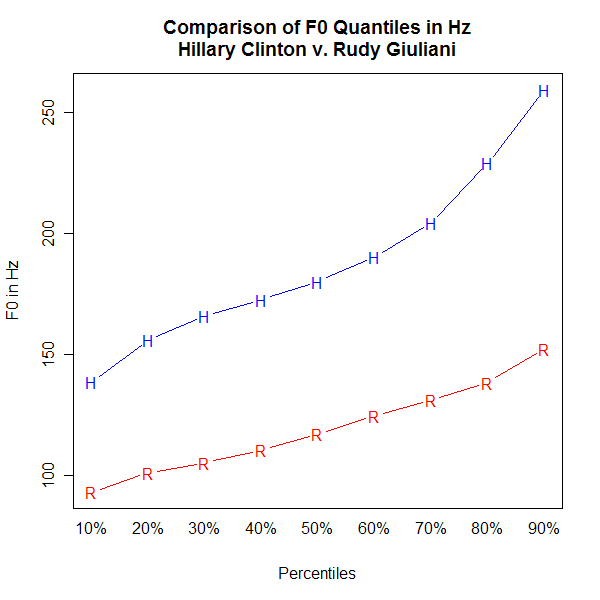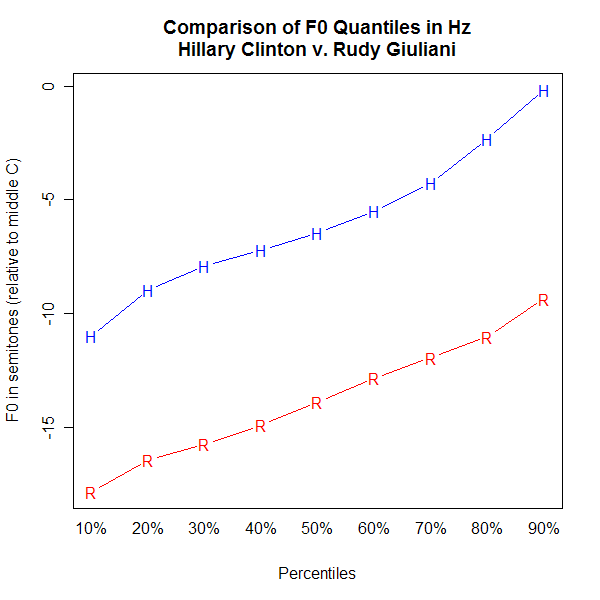October 18, 2007
You say potato, I say bologna
In the October 22 New Yorker, Michael Schulman reports on his conversations with Majella Hurley, an English dialect coach who is coaching Claire Danes as Eliza Doolittle in a revival of Pygmalion ("You say potato"). Halfway through the piece, Schulman turns his attention to the speech patterns of the current crop of American presidential candidates, and brings into the conversation another dialect coach, "Hurley’s colleague Beth McGuire, who also attended the matinée—she is the dialect coach for another of the Roundabout’s fall shows, 'The Overwhelming,' a drama, set in Rwanda, that involves seven different dialects".
McGuire, who had listened to some of the previous night’s Republican debate, had noticed a striking disparity—aside from the one in economic policy—between Giuliani and his most formidable Republican opponent. “I’m used to listening to Giuliani. He was my mayor,” she said. “So here I am listening to Giuliani going dadadadada”—she made a machine-gun sound—“and then here’s Mitt Romney with this whole other pattern: dah . . . dah . . . dah . . . But Giuliani is who Giuliani is, and how we speak is who we are. Giuliani is a dadadadada guy.”
I wonder what in the world McGuire might have meant by this.
Given that she's getting paid for coaching seven separate Rwandan dialects, I'm sure that she meant *something*. And my general rule in such cases is to assume that the expert had something sensible in mind, and to blame the journalist for screwing it up. But no matter who's responsible for this claimed contrast between dadadadada and dah . . . dah . . . dah . . ., a reasonable reader, I think, would take it to mean that Rudy Giuliani speaks a lot faster than Mitt Romney does, and in particular, that this difference could be heard in the Oct. 9 debate in Dearborn, MI (the debate that McGuire must have been referring to). However, as I reported a couple of days ago ("The tale of the tape: Those fast-talking southerners", 10/17/2007), Rudy Giuliani's average speech rate was 207 words per minute in that debate, while Mitt Romney's was 221 words per minute.
Is there some other quality of their delivery that deserves description as "dadadadada" vs. " dah . . . dah . . . dah . . ."? Here's a comparison of clips from each man's first answer in the Oct. 9 debate, so you can decide for yourself:
Frankly, I wonder whether McGuire (or Schulman) might have gotten Mitt Romney mixed up with one of the other candidates.
But maybe not, because Schulman quotes McGuire saying something just about equally puzzling about the speech patterns of Hillary Clinton.
[McGuire] suggested that Senator Hillary Clinton work on her melodiousness.“Any woman in a position of authority tends to lower her pitch,” she said. “But Hillary doesn’t vary her range a lot. She ends all her sentences on a down glide, which can make her sound masculine and hard.”
OK, maybe Hillary should work on her melodiousness, that's a matter of opinion. But is McGuire really suggesting that a candidate for president of the United States of America should systematically engage in uptalk? That would do wonders for her image, I'm sure.
In fact, Senator Clinton has a reasonable proportion of appropriately deployed non-terminal rises and levels, as in this passage from the Sept. 26 Democratic debate in Hanover NH:
In the transcript below, I've marked the three final-rising phrases in red, and the three final mid-level phrases in purple:
Well, what I have said is that
I will do everything I can to prevent Iran from becoming a nuclear power, including
the use of diplomacy,
the use of economic sanctions,
opening up direct talks.
We haven't even tried.
That's what is so discouraging about this. So then you have the Republican candidates on the other side
jumping to the kind of statements that you just read to us.
We need a concerted, comprehensive strategy to deal with Iran.
We haven't had it.
We need it.
And I will provide it.
I didn't have to look hard for this passage. I haven't counted, but I'd guess that Senator Clinton uses phrase-final rises and levels at least as often as any of the other candidates, and probably more than most. (You'll notice that the clips from Romney and Giuliani, above, involve no final rises or mid-levels -- though I'm sure that they sometimes use such contours.) It also sounds to me as if Clinton varies her pitch range, proportionally, at least as much as the other candidates -- and again, this is something that can easily be quantified.
I suppose that vision researchers get just as discouraged by what journalists write about colors, but let me tell you, it's hard out there for a phonetician.
“This may be a naïve thing to say, but I would hope that people actually listen to content,” said Hurley, voicing a sentiment that is not bloody likely.
Me, I would hope that dialect coaches and New Yorker writers, when commenting on the way people talk, would actually listen to their speech and describe it somewhat accurately, rather than peddling inaccurate stereotypes and generic advice. Perhaps they might even count and measure things, when they want to make authoritative-sounding generalizations and recommendations. But that sentiment is even less bloody likely, apparently.
[Update, 7:00 Friday morning: I thought I should take some of my own medicine, and do a small quantitative comparison of pitch ranges as this morning's Breakfast Experiment™.
For the half-minute audio clips that you can listen to above, here is a plot comparing Hillary Clinton and Rudy Giuliani in terms of the percentiles of their fundamental-frequency measurements. ("Fundamental frequency", or F0 -- commonly pronounced "eff zero" -- is the objective measurement of local periodicity in speech that corresponds to the subjective dimension of "pitch".)

And since the comparison should probably be made in proportional terms, here's the same plot expressed in semitones relative to middle C:

And for those of you who prefer numbers to graphics, here are the tables of data, with ratios and differences (calculated before rounding). In hertz (i.e. cycles per second):
| Hillary | Rudy | ratio | |
| 10% | 139 |
93 |
1.49 |
| 20% | 156 |
101 |
1.54 |
| 30% | 166 |
104 |
1.57 |
| 40% | 173 |
110 |
1.56 |
| 50% | 180 |
117 |
1.54 |
| 60% | 190 |
125 |
1.53 |
| 70% | 204 |
131 |
1.56 |
| 80% | 229 |
138 |
1.65 |
| 90% | 259 |
153 |
1.70 |
(In other words, Senator Clinton's median F0 was 180 Hz, while Mr. Giuliani's median F0 was 117 Hz; and similarly for the other percentiles.)
Alternatively, in semitones relative to middle C:
| Hillary | Rudy | difference | |
| 10% | -11.0 |
-17.9 |
6.9 |
| 20% | -9.0 |
-16.5 |
7.5 |
| 30% | -7.9 |
-15.7 |
7.8 |
| 40% | -7.2 |
-14.9 |
7.7 |
| 50% | -6.5 |
-13.9 |
7.4 |
| 60% | -5.5 |
-12.9 |
7.3 |
| 70% | -4.3 |
-11.9 |
7.7 |
| 80% | -2.3 |
-11.0 |
8.7 |
| 90% | -0.2 |
-9.3 |
9.2 |
(In other words, Senator Clinton's median F0 was 6.5 semitones below middle C, or between E and F; Mr. Giuliani's median F0 was about 7.4 semitones lower; and so on for their other percentiles.)
Does this support the view that Senator Clinton "doesn't vary her range a lot", at least compared to Mr. Giuliani? I'd say no. On the contrary, in fact.
Perhaps McGuire meant something different, say that Hillary Clinton's pitch range, though reasonably large in proportional terms, is too consistent from phrase to phrase relative to other politicians. But if you listen to the clips above, I think you'll find reason to doubt this idea as well. A quantitative test will have to wait for another morning, since my breakfast hour is over and it's time to get to work.
The most parsimonious hypothesis about all this, I think, is that McGuire and Schulman's evaluations of the candidates' speech were simply re-packaged stereotypes about groups (New Yorkers talk fast) and individuals (Hillary Clinton is masculine and hard), without any empirical basis whatsoever in the facts of any actual talk at any actual time.
I freely admit that this theory is an expression of my own stereotypes of what certain groups have to say about speech and language. This is what political commentary is like, all too often, and what popular discussions of speech and language are like, nearly always. At least, so it seems to me. I would have hoped for better from the New Yorker, but I'm afraid that in this case, the stereotypes (about journalists' quotations from experts, not about Hillary Clinton and people from New York) turned out to be true.]
Posted by Mark Liberman at October 18, 2007 10:50 PM